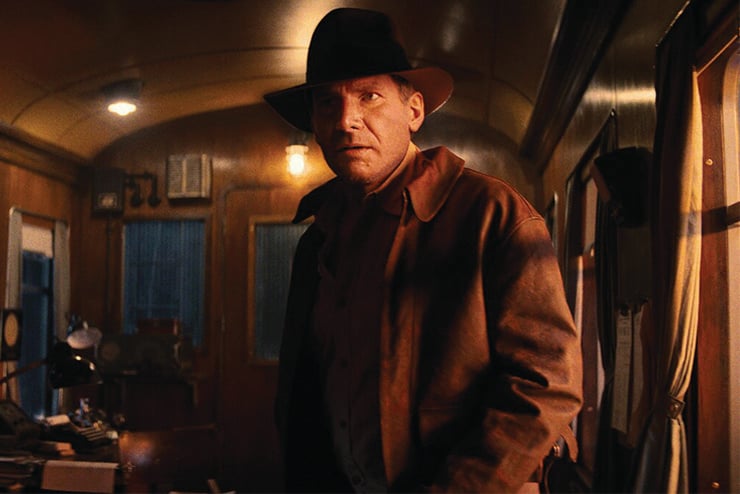Indiana Jones and the Dial of Destiny
Directed by James Mangold ◆ Written by Jez and John-Henry Butterworth and James Mangold ◆ Produced by Lucasfilms ◆ Distributed by Walt Disney Pictures
An archeological question: Is Indiana Jones and the Dial of Destiny a good film? Absolutely. It has plenty of Nazis on hand to shoot and since Indy must travel to Egypt there’s plenty of Middle Eastern cuisine to consume.
Better than this, the film is a genial meditation on the mortality of its hero, the demise of Europe, and, unfortunately, the mortal decline of its lead actor, Mr. Ford, with whom I share nearly the same age: he’s 81 years old and I am now 82. So I’m telling the truth when I say that I identified with Indy and his story. My sympathy for the lead character and the actor is not only through happenstance of birth but also through family. We first meet our hero retiring from Hunter College, the branch of the City University of New York, the school my dearly departed wife attended and which my niece now attends. And at which my dissertation advisor taught.
Although Ford displays the inevitable signs of age, he and his hero will likely be around for some more years, so let’s go forward with as much cheer as we can manage. To be sure, cheer is what the Indiana movies are all about, especially if you’re like me and enjoy fantasizing punching out bad guys and walking across racing train tops even as they plunge into low-lying tunnels. Still, there’s no denying Indy’s mortality. It’s irretrievably etched on Ford’s face.
Here’s the plot, which you doubtless already know or can guess. The film flashes back to 1944 when, while fighting Nazis in the French Alps, Indy and his archeological colleague, Basil Shaw, come across the antikythera, a 2000-year-old Ancient Greek dial instrument designed to track the celestial movements of our firmament and which in this film, possesses the power to travel through time. Clearly this is a device the Nazis want so they can reverse history and correct their stupid war-time mistakes. It’s now in the hands of the Nazi astrophysicist, Jürgen Voller (Mads Mikklesen) who has been brought to America to work on rockets in much the same manner as was Wernher von Braun.
After some frantic combat with the Nazis on a train across the Alps, Indy and Basil escape with part of the dial, which Indy intended to give to a museum. The story of the ancient MacGuffin still has not been resolved when we get back to Indy 25 years later as he teaches his last archeological class. Who should be his star pupil but Helena, Basil’s daughter (Phoebe Waller-Bridge). She’s stolen what remains of the antikythera and plans to sell it to the highest bidder. The chase is on, as Indy is determined to rescue the device or destroy it, which is what he assume would have been the intention of its inventor, Archimedes. Indy figures the ancient Greek was wise enough to know that time travel would wreak havoc on the world of the living and the dead.
Well, there’s more, much more. After all, this film is only a slightly redacted episode from a Saturday matinee serial that might well have played in 1950 at your local Bijou. As such, the film has to account for the other 14 chapters of action which traditionally comprised such pulp serials. Let me assure you, these other installments are entirely over the top. Each filled with hair-raising nonsense made convincing by excellent acting and direction. There’s Ford’s weathered countenance, with a bleak look in his aging eyes that seem to honestly reveal his astonishment that he would be able to carry off this madness. Then there’s Mikkleson’s Voller, with whom Indy must contend. As he did in his James Bond appearance in Casino Royale, Mikkleson convinces us of his character’s inhuman cleverness. His half-shut eyes are all-penetrating despite their constant squint. Waller-Bridges is delightfully goofy as the young lady who, though far too young for Indy, nevertheless provides our hero with the conventional lady-in-distress he needs to perform his rescue heroics. You know, pulling her back into the plane from which she’s about to fall and holding on to her as they time travel into the Roman Army’s 212 BC siege of Syracuse. Is this all too ridiculous? Well, we’ve got to allow Indy some poetic license.
Or has popular entertainment moved on from Indy, seemingly for more super heroes? Speaking for myself, I’ve seen quite enough superheroes in my lifetime. Mortal ones are more welcome, and more realistic. Thus I think, after reviewing films at Chronicles for the last 24 years—having written some 300 reviews since 1999—that it’s appropriate that this review of Indy be my last. Thank you all for reading and watching with me through the years. ◆

Leave a Reply